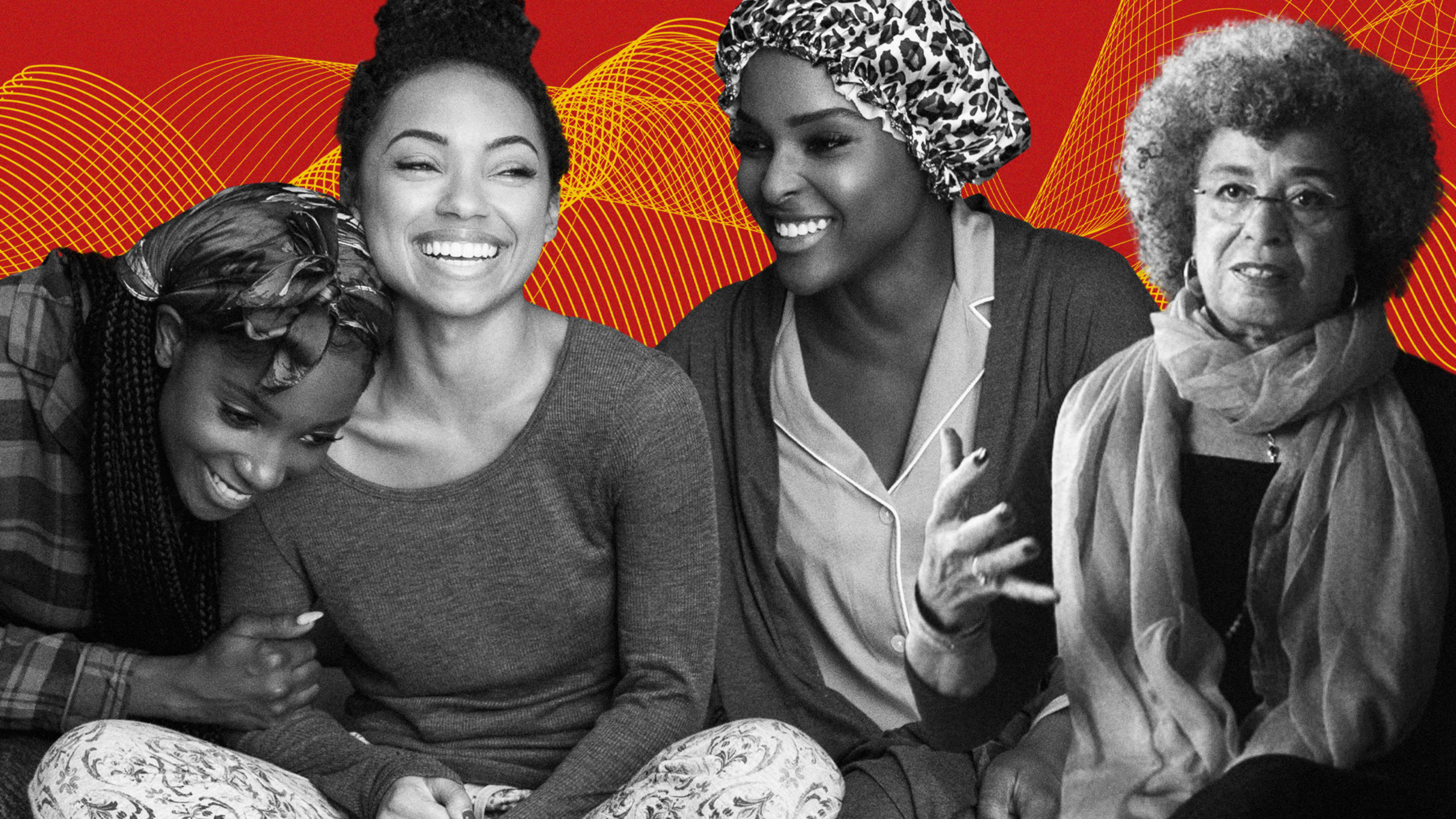When Netflix’s marketing arm Strong Black Lead officially launched in 2018, it was a flag in the ground that one of the world’s leading entertainment companies would use its influence to amplify Black voices and creators—and not just during Black History Month or another uprising.
Strong Black Lead has organically evolved from a simple suggestion to elevate Netflix’s catalog of Black programming into a deeper conversation and relationship with Black audiences through podcasts, video content, and campaigns that coalesce around the idea that there’s not a monolithic Black experience or single way to be Black.
“You can’t be a successful brand without having the trust and the equity of Black consumers,” says Maya Watson, director of editorial and publishing at Netflix. “All of us who have been Black at work know that, and I think sometimes it takes corporations a minute to catch up. But at Netflix, we’re a small group of Black people who were like, ‘We want to go build some stuff for the Black audience,’ and they’re like, ‘Okay, what do you need?'”
While Netflix has come under scrutiny for a workplace environment that the Wall Street Journal called “ruthless, demoralizing and transparent to the point of dysfunctional” in its 2018 exposé, the team behind Strong Black Lead says that doesn’t speak to their experience in receiving support not only to get their endeavor off the ground, but also the resources to push it to where it needs to go next.
Netflix has lessons to learn like any company, but Strong Black Lead is certainly a positive step in creating a meaningful framework for the Black experience through storytelling. It’s also a reminder that it’s not enough to just hire people of color—they need the space and tools to make their ideas realities.
Strong Black beginnings
The initial seed for Strong Black Lead was planted by Myles Worthington, a communications strategist who came onboard in 2016 as part of Netflix’s consumer marketing team. Worthington was used to being one of a few Black people (or the only Black person) in his prior jobs, so he frequently took it upon himself to ensure whichever companies he was working for had Black consumers in mind—Netflix included.
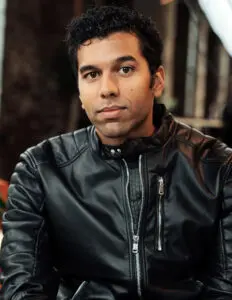
“Being at Netflix for a while, I was like, ‘How do we bridge the gap with Black press?’ And they were like, ‘We do that on a title basis, but it hasn’t been ongoing,'” says Worthington, who is now Netflix’s director of editorial and publishing. “The beauty of Netflix is that you can really create your own path.”
Worthington started by simply culling the Black-centric content coming to Netflix and reaching out to Black press for coverage. As that was catching on, Worthington says the PR team was also wrapping their minds around the fact that they had shows like She’s Gotta Have It and Dear White People coming out within a few months of each other. Those conversations led to First Time I Saw Me, a campaign that showcased Black creatives including Spike Lee and Ava DuVernay talking about the first time they saw themselves represented in media.
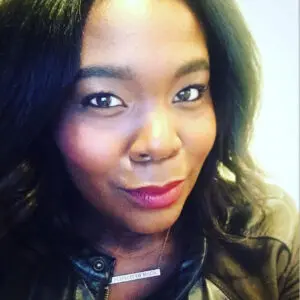
“It was a really strong moment for us to realize that people want to have these conversations,” Worthington says. “There’s power in having a separate space to celebrate this vibrant community.”
It was around that time that Watson was hired and immediately took stock of the increasingly competitive streaming landscape and what that meant specifically for Black audiences.
“When we thought about the breadth and variety of everything we have, we decided to build a direct line to our consumers,” Watson says. “Let’s build touch points that are based on things that they care about.”
And to do that, they needed a team.
Strong Black Team
Strong Black Lead started to build out its dedicated team by poaching Jasmyn Lawson, Giphy’s former culture editor. Watson says she was actually reading Fast Company‘s 2017 cover story on Giphy when she first spotted Lawson.
“I took a picture of [the article] and her name and I sent it to our recruiting partners,” Watson says. “I was like, ‘Go find her!'”
As it turned out, Lawson had already been in talks with Netflix about marketing and social roles, but she never committed.
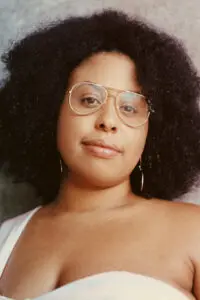
Then one day, Netflix followed her on Twitter.
“I tweeted it about like, ‘Oh my gosh, Netflix followed me on Twitter! Netflix is my boyfriend,'” Lawson says. “And a recruiter emailed me, ‘Liked your tweet—Maya would like to talk to you.’ Oh, this was a setup!”
After looking into Watson’s background, which includes being vice president of marketing and social media for the Oprah Winfrey Network and a regional field director for Barack Obama’s 2008 presidential campaign, Lawson was intrigued.
“I was like, ‘Okay, Black woman—I have time for you! Let’s chat,” Lawson says. “We had a very candid conversation about where do you want to be as a professional? And I want to learn. This is my first time working under a Black woman in such a high position of power in a corporate space. Coming from a place where there were very few Black employees, that was personal for me. In conjunction to doing great work, I wanted to work under great Black leadership and see how I can model that myself for my future.”
Strong Black Debut
The strategy was in place and the team was coming together—they just needed a name.
“The name seems so obvious, but if you were part of those brainstorms, it could’ve been a much different situation,” Watson says.
Strong Black Lead is actually what Netflix’s Black employee resource group called their recruiting events.
“They had these shirts and these notebooks and people didn’t even care to get our business card. They were like, ‘But where can I get that shirt, though?'” Watson says. “If you wear it, then that says something. You identify with that. So that’s how we came up with the name Strong Black Lead—shoutout to our HR partners!”
Until then, Strong Black Lead had existed behind the scenes, but it needed its debutante moment, which came with the now famous “A Great Day in Hollywood” spot, which aired during the 2018 BET Awards.
“How do we start to do something that feels artful and impactful? And it’s not just like a sizzle spot,” Watson says. “What we were trying to show is the depth and breadth of the talent that we had on the Netflix service. A lot of Black audiences, we had found in research, didn’t understand that we are one of the biggest producers and creators of Black content in entertainment. We hadn’t really shown the full tapestry of what we had.”
Strong Black Community
Since its official debut, Strong Black Lead has created two podcasts, Okay, Now Listen and Strong Black Legends; the video series Between Two Faves; a curated hub in response to the latest wave of protests against police brutality; and it led the push to license more Black classics.
It’s become what Watson likens to an HBCU (historically Black colleges and universities) within Netflix’s “education system.”
“An HBCU is special. It’s communal. It’s fellowship. And it’s very hard to replicate that across the entire education system,” Watson says. “The whole system doesn’t need to be like that, but Black people still need their space.”
It’s why Strong Black Lead has its own dedicated social team instead of everything rolling into Netflix’s main accounts. However, Lawson is clear that doesn’t mean that Strong Black Lead is Netflix’s only repository for Black content—or that Strong Black Lead speaks for all Black Netflix users.
.@ScottieBeam’s “chile” is the BEST reaction to @SylviaObell recommending #SAYIDO 🤣😂🤣 We're all crying!!
Full episode 👉🏾 https://t.co/R8LXvnEHQr pic.twitter.com/20m0e8SLSh
— Strong Black Lead (@strongblacklead) July 26, 2020
For example, how Netflix’s main account would talk about Dave Chapelle’s latest comedy special differs from how Strong Black Lead would approach it for their specific following.
“We always make sure we use the language that this is the SBL community,” Lawson says. “This isn’t the Black audience. This is specifically people who follow SBL, because not everyone Black is engaging with our content all the time.”
“[Working on Strong Black Lead] taught me that I am not an expert on Black people—I am just a lived experience as a Black woman,” says Dani Howe, community manager of editorial and publishing at Netflix. “It also taught me, and I hope it proves to other companies and even within this company, you can’t just have one. That person’s one experience is not enough—they’re not experts on Black people, they just are.”
Strong Black Influence
The Strong Black Lead team is clear that they’re not trying to monopolize Black audiences or simply shill Netflix’s Black TV shows and films. Their aim is to give other major companies the green light to start the conversation in a meaningful way for their own Black audiences.
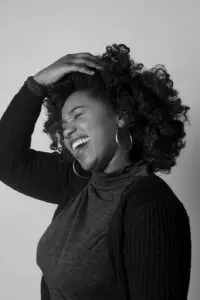
Strong Black Future
“The possibilities are endless,” Worthington says. “It’s just showing up in more spaces showing up on more platforms.”
Like getting back to their roots, so to speak, with apparel.
“The Genesis of SBL and the naming of it, we decided on it because people love the way it looked when you’re walking down the street with a shirt,” Worthington says. “That means something for it to be blazoned across your chest. How can we show up more places like that so people can feel connected to SBL and that it’s a part of them?”
For Watson, she sees Strong Black Lead expanding to being more inclusive across the diaspora.
“We talk about how Blackness is global, and we’re a global platform,” Watson says. “There’s a whole lived Black experience in Latin America and in Africa and in Europe. This matters around the world so, how do we start to do that?”
Whatever path the Strong Black Lead takes, it seems as if Netflix will help clear it for them.
Strong Black Lead works because it’s organic. It wasn’t created in response to a race-related crisis or annual endeavor that fades away when certain holidays do. It was created by Black people, for Black audiences, to showcase and celebrate the Black experience.
“That’s what makes Netflix so special is that in most companies there’s hierarchy, there are approvals,” Watson says. “Netflix is like, we hire great people and then get out of their way, let them run, let them flourish, and let them do the best work of their lives.”
Recognize your brand’s excellence by applying to this year’s Brands That Matter Awards before the early-rate deadline, May 3.
